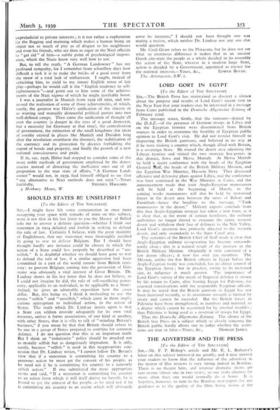LORD GORT IN EGYPT [To the Editor of THE SPECTATOR]
SIR,—The British Press has maintained so discreet a silence about the purpose and results of Lord Gort's recent visit to the Near East that your readers may be interested in a message from Cairo published in the Deutsche Allgemeine Zeitung of February 22nd.
The message states, firstly, that the rumours—denied by the D.A.Z.—of the presence of German troops in Libya and on the Egyptian frontier were disseminated from British sources in order to overcome the hostility of Egyptian public opinion to Lord Gort's visit. He did not restrict himself to inspecting the British garrisons, and behaved in no way as if he were visiting a country which, though allied with Britain, is a sovereign State. He toured the desert area adjoining the Libyan frontier and visited the two strategic key-points in this district, Siwa and Mersa Matruh. At Mersa Matruh he held a secret conference with the heads of the Egyptian General Taff, the heads of the British Military Mission, and the Egyptian War Minister, Hussein Sirry. They discussed offensive and defensive plans against Libya, and the conference was later continued in the War Ministry at Cairo, and the announcement made that joint Anglo-Egyptian manoeuvres will be held at the beginning of March; in the coming weeks manoeuvres will also be held by motorised forces in the desert area between the oases of Bahari and Farahf rah—hence the headline to the message, " Tank manoeuvres in the desert." Military experts conclude from this that Anglo-Egyptian strategy has taken a new form, as it is clear that, in the event of serious hostilities, the military authorities no longer intend to evacuate the entire western desert and withdraw their line of defences to the Nile Valley. Lord Gort's attention was primarily directed to the western desert, and only secondarily to the Suez Canal area.
The activities of the British Chief of Staff made it clear that Anglo-Egyptian military co-operation has become extraordi- narily close ; this is a natural result of the increase in the British Military Mission. Originally it only consisted of a few dozen officers ; it now has over 200 members. The Mission, unlike the few British officers in Egypt before the Anglo-Egyptian treaty was concluded, has no direct control of the Egyptian Army ; but in practice, owing to its increased size, its influence is much greater. The importance of Lord Gort's survey of the needs of Imperial defence is shown by his return to Cairo, after leaving Egypt for Palestine, for renewed conversations with the responsible Egyptian officials. It may be noted that the British garrison in Egypt has not been increased recently, as its maximum strength is limited by treaty and cannot be exceeded. But the British forces in Palestine have been strengthened, in numbers and material, to a degree which cannot be accounted for by internal troubles ; thus Palestine is being used as a reservoir of troops for Egypt.
Thus the Deutsche Allgemeine Zeitung. The silence of the British free Press on a subject which so closely concerns the British public hardly allows one to judge whether the asser-
tions are true or false.—Yours, &c., MORGAN JAMES.


























































 Previous page
Previous page